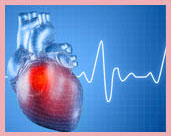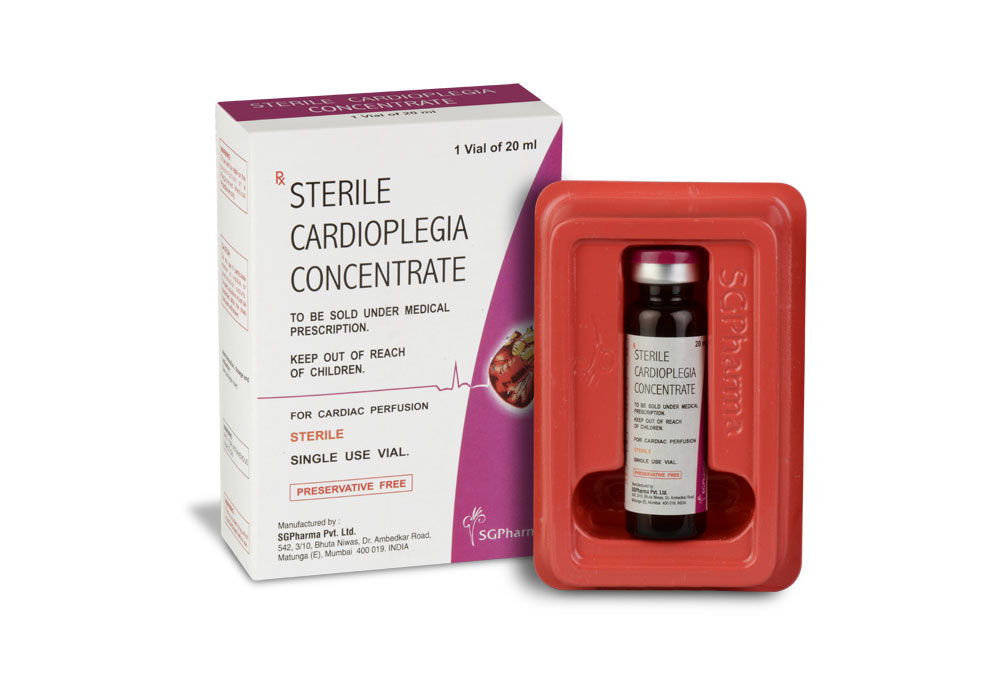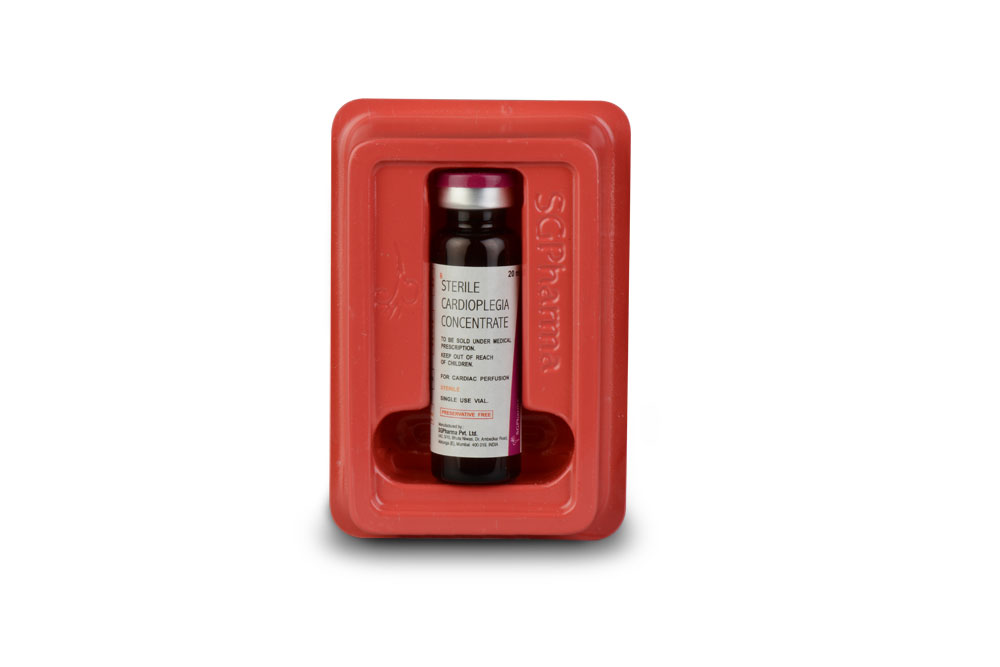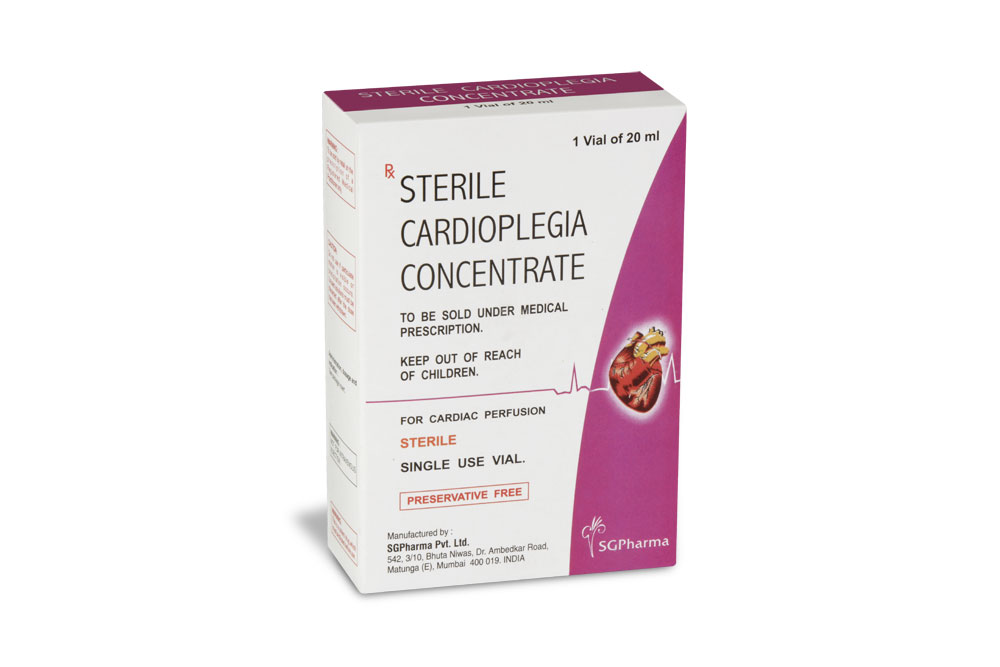
Each 20 ml contains
For the use of a Registered Medical Practitioner or a Hospital or a Institution only.
STERILE CARDIOPLEGIA CONCENTRATE contains Potassium Chloride, Magnesium Chloride, Procaine Hydrochloride. It is used in open heart surgery. Potassium Chloride USP is chemically designated KCl. The molecular weight is 74.55. Magnesium Chloride USP is chemically designated magnesium chloride, hexahydrate. The molecular formula is MgCl2 • 6 H2O. The molecular weight is 203.30. Procaine Hydrochloride USP is chemically designated 2-(Diethylamino)ethyl p-aminobenzoate monohydrochloride. The molecular formula is C13H20N2O2 • HCl. The molecular weight is 272.78.
STERILE CARDIOPLEGIA CONCENTRATE is a sterile, nonpyrogenic, clear colourless to pale yellow solution filled in a 20 ml amber tubular glass vial.
COMPOSITION :
Each ml contains :
Potassium Chloride USP 59.65 mg
Magnesium Chloride USP 162.65 mg
Procaine Hydrochloride USP 13.64 mg
Water for Injection USP q.s.
ACTIONS :
STERILE CARDIOPLEGIA CONCENTRATE is other cardiovascular category drug. It protects the myocardium by inducing a rapid and complete diastolic arrest, minimizing myocardial energy requirements and preventing ischaemic damage during the arrest phase, and minimizing or preventing reperfusion injury once coronary blood flow is restored. The use of cardioplegia solution has substantially increased the safety of cardiac surgery. Potassium (K+) ion concentration is responsible for prompt cessation of mechanical myocardial contractile activity. The immediacy of the arrest thus preserves energy supplies for postischaemic contractile activity in diastole. Potassium Chloride is a tonicity agent. Magnesium (Mg++) ion may help stabilize the myocardial membrane by inhibiting a myosin phosphorylase, which protects adenosine triphosphate (ATP) reserves for postischaemic activity. The protective effects of magnesium and potassium have been shown to be additive. The chloride (Cl-) ions have no specific role in the production of cardiac arrest. The chloride ions are present to maintain the electroneutrality of the solution.
Procaine hydrochloride protects the myocardium during cardiac surgery. For surgical management of ischaemic heart disease, coronary revascularization should be carried out with the aid of cardiopulmonary bypass on a motionless heart. Motionless heart is achieved chemically by causing local hyperkalaemia using STERILE CARDIOPLEGIA CONCENTRATE as well as with local cardiac hypothermia. For hyperkalaemia, potassium ions in STERILE CARDIOPLEGIA CONCENTRATE as well as in Ringer’s injection are helpful.
Magnesium ions inhibit the release of catecholamines and exert a direct effect on adrenergic receptors and blood vessels so that myocardium is not able to contract and thus motionless heart is available for bypass. Magnesium ions are also required at the time of reperfusion to protect the myocardium against reperfusion damage by limiting reperfusion calcium overload. Hypothermia is assured by infusing cold (2°C to 8°C) solution of Ringer’s injection and STERILE CARDIOPLEGIA CONCENTRATE into the pericardial sac and removing warmed instillate by suction and replacing cold solution continuously to ensure maintenance of hypothermia. With profound local hypothermia as well as with hyperkalaemia, one can assure motionless heart for cardiac surgery.
PHARMACOKINETICS :
Potassium chloride is generally readily absorbed from the gastrointestinal tract. Potassium is excreted mainly by the kidneys; it is secreted in the distal tubules in exchange for sodium or hydrogen ions. Some potassium is excreted in the faeces and small amounts may also be excreted in sweat. About one-third of magnesium is absorbed from the small intestine after oral doses and even soluble magnesium salts are generally very slowly absorbed. The fraction of magnesium absorbed increases if magnesium intake decreases. In plasma, about 25 to 30 % of magnesium is protein bound. Parenteral magnesium salts are excreted mainly in the urine, and oral doses are eliminated in the urine (absorbed fraction) and the faeces (unabsorbed fraction). Small amounts are distributed into breast milk. Magnesium crosses the placenta. Procaine is poorly absorbed from mucous membranes and is usually given parenterally. It is rapidly hydrolysed by plasma cholinesterase to para-aminobenzoic acid and diethylaminoethanol; some may also be metabolised in the liver. Only about 6 % is bound to plasma proteins. About 80 % of the para-aminobenzoic acid is excreted unchanged or conjugated in the urine. About 30 % of the diethylaminoethanol is excreted in the urine, the remainder being metabolised in the liver.
INDICATIONS :
STERILE CARDIOPLEGIA CONCENTRATE is indicated for use in combination with ischaemia and hypothermia to induce cardiac arrest during open – heart surgery and to preserve the myocardium during asystole.
Administration :
FOR CARDIAC PERFUSION. NOT FOR INTRAVENOUS INJECTION. MUST NOT BE USED IN SERIES CONNECTION.
Dosage :
The following information is suggested as a guide and is subject to variation according to the preference and experience of the surgeon. STERILE CARDIOPLEGIA CONCENTRATE must be diluted before use. Add 1 vial (20 ml) cooled to 1 litre of Ringer’s injection which has been cooled to 4°C. When the patient’s body temperature has been reduced to 32°C, the aorta is occluded and the 1 litre solution is infused into the coronary arteries for 2 - 3 min. The myocardial temperature should be maintained < 25°C throughout the period of cardiopulmonary bypass. After this addition, the solution must be used within 24 hours. The initial rate of infusion may be 300 ml/m2/minute (about 540 ml/min in a 5’ 8”, 70 kg adult with 1.8 square meters of surface area) given for a period of two to four minutes. Concurrent external cooling (regional hypothermia of the pericardium) may be accomplished by instilling a refrigerated (4°C) physiologic solution such as a balanced electrolyte replacement solution or Ringer’s Injection into the chest cavity. Should myocardial electromechanical activity persist or recur, the solution may be reinfused at a rate of 300 ml/m2/min for a period of two minutes. Reinfusion of the solution may be repeated every 20 to 30 minutes or sooner if myocardial temperature rises above 15° to 20°C or returning cardiac activity is observed. The regional hypothermia solution around the heart also may be replenished continuously or periodically in order to maintain adequate hypothermia. Suction may be used to remove warmed infusates. An implanted thermistor probe may be used to monitor myocardial temperature. The volumes of solution instilled into the aortic root may vary depending on the duration or type of open heart surgical procedure.
Each 20 ml vial contains :
Potassium – 16 mmol,
Magnesium – 16 mmol,
Procaine – 1 mmol.
CONTRAINDICATIONS :
STERILE CARDIOPLEGIA CONCENTRATE is contraindicated in MI, ECG abnormalities & arrhythmias including ventricular fibrillation.
WARNINGS :
This solution should be used only by those trained to perform open heart surgery. This solution is intended only for use during cardiopulmonary bypass when the coronary circulation is isolated from the systemic circulation. (See DOSAGE AND ADMINISTRATION, INDICATIONS )
PRECAUTIONS :
1. Myocardial temperature should be monitored during surgery to maintain hypothermia.
2. Continuous electrocardiogram monitoring is essential to detect changes in myocardial activity during the procedure.
3. Appropriate equipment to defibrillate the heart following cardioplegia should be readily available.
4. Inotropic support drugs should be available during postoperative recovery.
5. Do not administer unless solution is clear and container is undamaged.
6. Discard unused portion.
Pregnancy : Category C
Animal reproduction studies have not been conducted with Cardioplegic Solution. It is also not known whether this solution can cause foetal harm when administered to a pregnant woman or can affect reproduction capacity. Cardioplegic Solution should be given to a pregnant woman only if clearly needed.
Paediatric Use :
Safety and effectiveness in paediatric patients have not been established. Because of differences in structure, function, and metabolism, clinical myocardial protection strategies and Cardioplegia solutions that are effective in adult hearts may be less effective in the immature heart.
Geriatric Use :
Clinical studies of cardioplegic solution did not include sufficient numbers of subjects aged 65 and over to determine whether they responded differently from younger subjects. Other reported clinical experience has not identified differences in responses between older and younger patients. In general, dose selection for an elderly patient should be cautious, usually starting at the low end of the dosage range reflecting the greater frequency of decreased hepatic, renal, or cardiac function, and of concomitant disease. This product is unique in that there is no hepatic or renal excretion and specific adjustments for dosing in the elderly are not known.
INTERACTIONS :
Some medicines and STERILE CARDIOPLEGIA CONCENTRATE may interfere with each other. These include :
- medicines which are used to treat myasthenia gravis, such as pyridostigmine
- acetazolamide, a medicine used to treat glaucoma, fluid retention and certain rare types of epilepsy (fits)
- medicines used to help you sleep or to treat anxiety or depression
- strong pain relievers
- diuretics (fluid tablets) such as triamterene, spironolactone and amiloride
- angiotensin converting enzyme (ACE) inhibitors, medicines for high blood pressure and some other heart conditions
- medicines containing potassium
- cyclosporin, a medicine used to reduce the activity of the body’s immune system
- a group of antibiotics for treating infections, known as sulfonamides
- hyaluronidase, used for bruising and preventing skin reactions to chemotherapy
- neuromuscular blocking agents, medicines used to relax muscles.
SIDE EFFECTS :
Intraoperative and perioperative potential hazards of open heart surgery include myocardial infarction, electrocardiographic abnormalities, and arrhythmias, including ventricular fibrillation. Spontaneous recovery after cardioplegic cardiac arrest may be delayed or absent
when circulation is restored. Defibrillation by electric shock may be required to restore normal cardiac function. STERILE CARDIOPLEGIA CONCENTRATE can also cause excitation of CNS, depression, drowsiness; respiratory failure; coma; numbness of tongue & perioral region. Rarely, allergic reactions

 Cardiovascular
Cardiovascular








